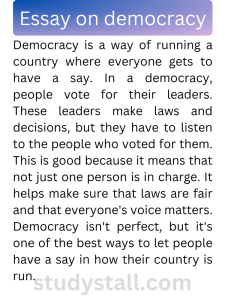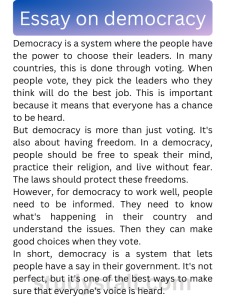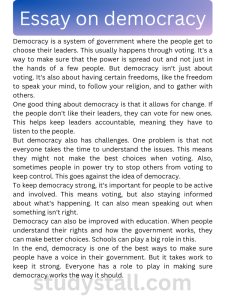Democracy has emerged as a powerful and prevailing form of governance around the world. It is a system that recognizes the voice and participation of the people in decision-making processes. With its roots dating back to ancient times, democracy has evolved over centuries, shaping societies and providing a framework for social, political, and economic progress.
Essay on Democracy (100 Words)
Democracy is a way of running a country where everyone gets to have a say. In a democracy, people vote for their leaders. These leaders make laws and decisions, but they have to listen to the people who voted for them. This is good because it means that not just one person is in charge. It helps make sure that laws are fair and that everyone’s voice matters. Democracy isn’t perfect, but it’s one of the best ways to let people have a say in how their country is run.
Essay on Democracy (200 Words)
Democracy is a system where the people have the power to choose their leaders. In many countries, this is done through voting. When people vote, they pick the leaders who they think will do the best job. This is important because it means that everyone has a chance to be heard.
But democracy is more than just voting. It’s also about having freedom. In a democracy, people should be free to speak their mind, practice their religion, and live without fear. The laws should protect these freedoms.
However, for democracy to work well, people need to be informed. They need to know what’s happening in their country and understand the issues. Then they can make good choices when they vote.
In short, democracy is a system that lets people have a say in their government. It’s not perfect, but it’s one of the best ways to make sure that everyone’s voice is heard.
Essay on Democracy (300 Words)
Democracy is a system of government where the people get to choose their leaders. This usually happens through voting. It’s a way to make sure that the power is spread out and not just in the hands of a few people. But democracy isn’t just about voting. It’s also about having certain freedoms, like the freedom to speak your mind, to follow your religion, and to gather with others.
One good thing about democracy is that it allows for change. If the people don’t like their leaders, they can vote for new ones. This helps keep leaders accountable, meaning they have to listen to the people.
But democracy also has challenges. One problem is that not everyone takes the time to understand the issues. This means they might not make the best choices when voting. Also, sometimes people in power try to stop others from voting to keep control. This goes against the idea of democracy.
To keep democracy strong, it’s important for people to be active and involved. This means voting, but also staying informed about what’s happening. It can also mean speaking out when something isn’t right.
Democracy can also be improved with education. When people understand their rights and how the government works, they can make better choices. Schools can play a big role in this.
In the end, democracy is one of the best ways to make sure people have a voice in their government. But it takes work to keep it strong. Everyone has a role to play in making sure democracy works the way it should.
What is Democracy?
At its core, democracy is a system of government that empowers the citizens to participate in political decision-making. It provides individuals with the right to vote, express their opinions freely, and contribute to the development and direction of their nation. Democracy promotes the idea that power ultimately lies with the people, who elect representatives to govern on their behalf.
The Origins of Democracy
The concept of democracy can be traced back to ancient civilizations such as Athens in ancient Greece. It was in Athens that the world witnessed the birth of direct democracy, where citizens directly participated in the decision-making process. However, democracy in its modern form has evolved significantly since then.
Key Principles of Democracy
- Popular Sovereignty: Democracy places power in the hands of the people, ensuring that their consent and approval are essential for any decision-making process.
- Rule of Law: Democracy upholds the principle that everyone, including those in positions of authority, is subject to the law. This promotes fairness, justice, and accountability.
- Political Pluralism: Democracy allows for multiple political parties and various ideologies to coexist, promoting healthy competition and diversity of thought.
- Equality and Human Rights: Democracy emphasizes the protection of individual rights and equality for all citizens, regardless of their gender, race, religion, or social status.
- Free and Fair Elections: Democracy ensures that elections are conducted transparently, with equal opportunities for all candidates to participate. This allows citizens to choose their representatives freely.
The Advantages of Democracy
- Protection of Individual Rights: Democracy guarantees the protection of fundamental human rights, such as freedom of speech, religion, and assembly. It provides a platform for citizens to voice their concerns and hold the government accountable.
- Stability and Peace: Democracies tend to be more stable and peaceful compared to authoritarian regimes. By allowing citizens to have a say in decision-making, it reduces the likelihood of political upheaval and violent conflicts.
- Economic Growth and Development: Democracy fosters an environment that encourages innovation, entrepreneurship, and economic growth. By providing citizens with a voice, it enables them to demand policies that promote economic development and social welfare.
- Transparency and Accountability: Democracy requires governments to be transparent in their actions and be accountable to the people. This helps prevent corruption and ensures that public officials act in the best interest of the citizens.
- Social Progress and Inclusion: Democracy promotes social progress by allowing marginalized groups to have a voice in shaping policies. It ensures that the needs and concerns of all citizens, regardless of their background, are considered.
Challenges and Criticisms of Democracy
- Political Polarization: Democracies often face the challenge of increasing polarization, where political parties and individuals become divided along ideological lines. This can hinder effective decision-making and lead to gridlock.
- Inequality: Despite its principles of equality, democracy can struggle to address deep-rooted social and economic inequalities. Disparities in wealth and power can affect the fairness of elections and the representation of marginalized groups.
- Slow Decision-Making: The democratic process, with its emphasis on consensus-building and deliberation, can sometimes result in slow decision-making. Urgent issues may require prompt action, which can be hindered by bureaucratic procedures.
- Manipulation and Populism: Democracy is susceptible to manipulation by charismatic leaders who exploit public sentiment for personal gain. Populist movements can undermine democratic institutions and promote divisive policies.
- Voter Apathy: Low voter turnout and citizen apathy can weaken the effectiveness of democracy. When individuals disengage from the political process, it undermines the legitimacy of elected representatives and reduces public participation.
The Future of Democracy
As societies continue to evolve, the concept of democracy will also face new challenges and opportunities. Technological advancements, globalization, and changing demographics will shape the future of democratic governance.
To ensure the continued success of democracy, it is crucial to address its shortcomings and adapt to emerging trends. This includes promoting inclusivity, bridging social and economic inequalities, and leveraging technology to enhance citizen engagement and participation.
In conclusion, democracy stands as a vital pillar of modern governance, providing citizens with a platform to express their opinions, protect their rights, and shape the future of their society. While it may face challenges and criticisms, democracy’s strength lies in its ability to evolve, adapt, and foster a society that values freedom, equality, and progress.
FAQ
1. What is democracy?
Democracy is a system of government that allows citizens to participate in political decision-making, giving them the right to vote, express their opinions, and contribute to the development of their nation.
2. Where did democracy originate?
The concept of democracy can be traced back to ancient civilizations, such as Athens in ancient Greece, where direct democracy was born. However, democracy has evolved significantly since then.
3. What are the key principles of democracy?
The key principles of democracy include popular sovereignty, rule of law, political pluralism, equality and human rights, and free and fair elections.
4. What are the advantages of democracy?
Some advantages of democracy include the protection of individual rights, such as freedom of speech and religion, and the promotion of stability and peace compared to authoritarian regimes.
